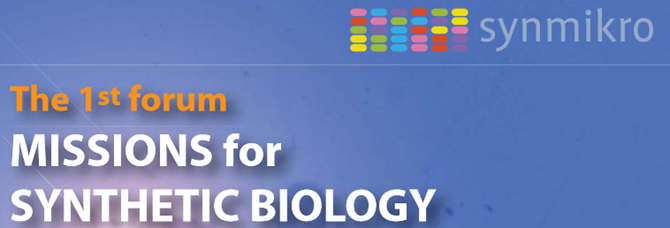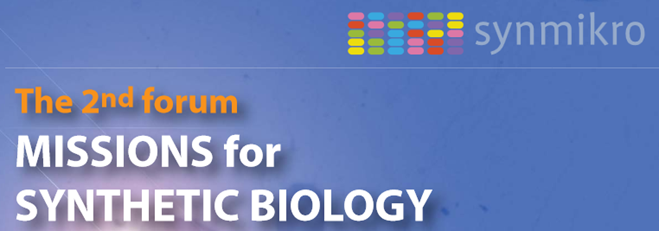Team:Marburg/Human Practice/Conferences:MissionsSynmikro
From 2013.igem.org
m |
|||
| Line 12: | Line 12: | ||
[[File:Missions2.png|400px|center]] | [[File:Missions2.png|400px|center]] | ||
'''Topic: “The dark side of Synthetic Biology”''' | '''Topic: “The dark side of Synthetic Biology”''' | ||
| - | + | Since January 2013, PhD students of the LOEWE Center for Synthetic Microbiology (Synmikro) have been organizing a discussion forum entitled “Missions for Synthetic Biology”. They aim at a forum of open discussion and creative enthusiasm on how synthetic biology can be used to solve problems in all domains of our life. The first topic of ‘Missions’ was ethical aspects of synthetic biology – that’s why this mission had the provocative title: “The dark side of Synthetic Biology”. The forum started with a seminar on bioethics as a part of applied ethics. An important message is that scientists have to think about a potential dual-use of their discoveries and inventions. Dual use – in essence - means that every discovery can be used in a positive or in a negative way. Therefore, an important point of discussion was how far academic freedom should be cut to ensure security. This issue was illustrated by an amazing lecture by Prof. Becker from the Dep. of Virology, Philipps University, Marburg. Modern biotechnology could construct gene modified pathogenic agents. “Problematic” experiments (e.g. increase virulence or weaponisation) were not forbidden but scientists have to take care. An important and recent example was the H5N1 virus. H5N1 influenza virus infects birds and is a possible pandemic virus. Two important publications lead to an acute debate. The question was if the data should be published. There was a big fear of misuse but finally the data were published. Who should decide in the future with experiments can be made? Should only selected scientists get knowledge of dangerous experiments but who should select them? A further question was: Should some results never be published if they contain explosive material? At the end of a heated debate, all participants agreed that synthetic biology requires a constant ethical debate to define values in this young and emerging part of science. In this meaning all members agreed that this discussion must include the public to prevent misunderstandings and fears!<br> | |
[[Media:Mission_Vortrag_final.pdf]] | [[Media:Mission_Vortrag_final.pdf]] | ||
{{:Team:Marburg/Template:ContentEnd}} | {{:Team:Marburg/Template:ContentEnd}} | ||
{{:Team:Marburg/Template:Footer}} | {{:Team:Marburg/Template:Footer}} | ||
Revision as of 02:54, 25 September 2013
Missions SYNMIKRO
The “Missions for Synthetic Biology“ are public meetings organized by a group of Ph.D. students of different SYNMIKRO research groups. Every meeting deals with current aspects of Synthetic Biology and biotechnology and leads to stimulating discussions according to the topic. So for example the topics “Biofuels” and “The dark side of Synthetic Biology” were discussed critically and we as the iGEM team joined the monthly events with great interest. In their third forum at the 16th of July we presented our project PHAECTORY to get some helpful feedback about our project and to discuss especially the safety issues.
Topic: Biofuels
Topic: “The dark side of Synthetic Biology”
Since January 2013, PhD students of the LOEWE Center for Synthetic Microbiology (Synmikro) have been organizing a discussion forum entitled “Missions for Synthetic Biology”. They aim at a forum of open discussion and creative enthusiasm on how synthetic biology can be used to solve problems in all domains of our life. The first topic of ‘Missions’ was ethical aspects of synthetic biology – that’s why this mission had the provocative title: “The dark side of Synthetic Biology”. The forum started with a seminar on bioethics as a part of applied ethics. An important message is that scientists have to think about a potential dual-use of their discoveries and inventions. Dual use – in essence - means that every discovery can be used in a positive or in a negative way. Therefore, an important point of discussion was how far academic freedom should be cut to ensure security. This issue was illustrated by an amazing lecture by Prof. Becker from the Dep. of Virology, Philipps University, Marburg. Modern biotechnology could construct gene modified pathogenic agents. “Problematic” experiments (e.g. increase virulence or weaponisation) were not forbidden but scientists have to take care. An important and recent example was the H5N1 virus. H5N1 influenza virus infects birds and is a possible pandemic virus. Two important publications lead to an acute debate. The question was if the data should be published. There was a big fear of misuse but finally the data were published. Who should decide in the future with experiments can be made? Should only selected scientists get knowledge of dangerous experiments but who should select them? A further question was: Should some results never be published if they contain explosive material? At the end of a heated debate, all participants agreed that synthetic biology requires a constant ethical debate to define values in this young and emerging part of science. In this meaning all members agreed that this discussion must include the public to prevent misunderstandings and fears!
Media:Mission_Vortrag_final.pdf
 "
"






